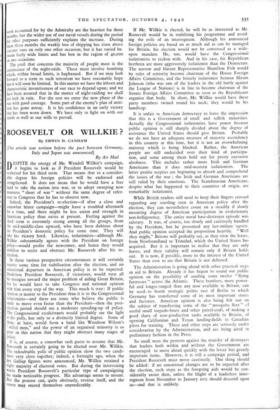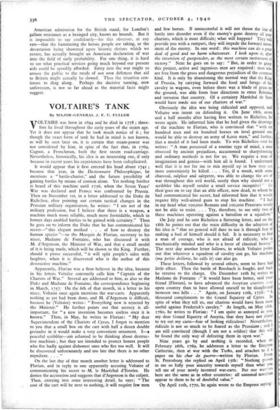ROOSEVELT OR WILLKIE ?
By ERWIN D. CANHAM
[This article was written before the pact between Germany, Italy and japan was announced] By Air Mail DESPITE the energy of Mr. Wendell Willkie's campaign, it begins to look as if President Roosevelt would be re-elected for his third term. That means that to a consider- able degree his foreign policies will be endorsed and strengthened. It does not mean that he would have a free hand to take the nation into war, or to adopt sweeping new measures " short of war " without the same degree of refer- ence to Congress that he has to observe now.
Indeed, the President's re-election—if after a close and somewhat bitter campaign—might leave a troubled aftermath for a time, and there might be less union and strength in American policy than exists at present. Feeling against the third term is extremely strong among all the groups, from the mid-middle-class upward, who have been dubious about the President's domestic policy for some time. They will take his victory hard. Likewise, isolationists—although Mr. Willkie substantially agrees with the President on foreign Policy—would prefer the newcomer, and hence they would mobilise to resist and obstruct Mr. Roosevelt after his re- election.
In these various prospective circumstances it will certainly require some time for stabilisation after the election, and no sensational departure in American policy is to be expected. Doubtless President Roosevelt, if victorious, would turn all his energies toward the major problem of aiding Great Britain, but he would have to take Congress and national opinion with him every step of the way. This much is true: If public opinion is nearer to the President than it is to the Congressional isolationists andthere are some who believe the public is ready to move even faster than the President—then the post- election period should see a moderate speeding-up of policy. The Congressional recalcitrants would probably see the light at the polls, but only to a distinctly limited degree. Some of them, at least, would form a band like Woodrow Wilson's "wilful men," and the power of an organised minority is so great in this nation that they might obstruct many stages of Policy.
It is, of course, a somewhat rash guess to assume that Mr. Roosevelt is certainly going to be elected over Mr. Willkie. The redoubtable polls of public opinion show the two candi- dates very close together; indeed, a fortnight ago, when the last Gallup figures were announced, Mr. Wink retained a alight majority of electoral votes. But during the intervening weeks President Roosevelt's particular type of campaigning has made noticeable.progress. His advantage seems to mount. But the process can, quite obviously, reverse itself, and the voters may record themselves unpredictably. If Mr. Willkie is elected, he will be as interested as Mr. Roosevelt would be in stabilising his programme and avoid- ing the evils of an interregnum. Although his announced foreign policies are based on as much aid as can be managed for Britain, his election would not be construed as a wide- open mandate. He, too, would have the Congressional isolationists to reckon with. And in his case, his Republican brethren are more aggressively isolationist than the Democrats. The narrow and blatant Representative Hamilton Fish would by rules of seniority become chairman of the House Foreign Affairs Comniittee, and the bitterly isolationist Senator Hiram Johnson (who was one of the leaders in the old battle against the League of Nations) is in line to become chairman of the Senate Foreign Affairs Committee as soon as the Republicans organise that body. In short, Mr. Willkie would have these party members twined round his neck; they would be his handicap.
It is unfair to American democracy to leave the impression that this is a Government of small and selfish minorities. Actually the Congressional isolationists have power because public opinion is still sharply divided about the degree of assistance the United States should give Britain. Probably we do not have an adequate measure of majority ascendancy in this country at this time, but it is not an overwhelming majority which is being blocked. Rather, the American people are still undecided over their kind of participa- tion, and some among them hold out for pretty extensive aloofness. This includes rather more Irish and German Americans than it does mid-western isolationists. The latter prairie sceptics are beginning to absorb and comprehend the issues of the war ; the Irish and German Americans are still ruled by their emotions. The Scandinavian Americans, despite what has happened to their countries of origin, are remarkably isolationist.
While British readers still need to keep their fingers crossed regarding any startling turn in American policy after the election, they can nevertheless count on a steadily if slowly mounting degree of American participation in evolutionary non-belligerency. The entire naval base-destroyer episode was salutary. It was, of course, too slowly and cautiously handled by the President, but he prevented any last-minute -upsets. And public opinion accepted the proposition heartily. " Well they might," Britons will probably say, as they view the leases, from Newfoundland to Trinidad, which the United States has acquired. But it is important to realise that they are only leases, and their validity will remain only if Britain holds out. It is now, if possible, more to the interest of the United States than ever to see that Britain is not defeated.
The Administration is going ahead with other practical steps in aid to Britain. Already it has begun to sound out public opinion on the possibility of sending some twelve " flying fortresses " across the Atlantic. These bombers, more power- ful and longer-ranged than any now available to Britain, can be used- to bomb strategic points east of Berlin to which Germany has transferred some of its most important stores and factories. American opinion is also being felt out on the subject of transferring some of the " mosquito fleet" c f useful small torpedo-boats and-other patrol-craft, of making a good share of new-production tanks available to Britain, of opening Californian and Texan landing-fields to Canadian pilots for training. These and other steps are seriously under consideration by the Administration, and are being aired in preliminary fashion in the Press.
So small were the protests against the transfer of destroyers that leaders both within and without the Government are encouraged to move ahead quickly with the lesser but greatly important items. However, it is still a campaign period, and President Roosevelt must move cautiously. One thing should be added: if no sensational changes are to be expected after the election, such steps as the foregoing aids would be con- siderably easier then, unless the blight of a leaderless inter- regnum from November to January 2ISt should descend upon us—and that is unlikely. American admiration for the British stand, for London's gallant resistance as a besieged city, knows no bounds. But it is impossible to say confidently—for this observer, at any rate—that the hammering the heroic people are taking, or the devastation being showered upon historic shrines which we revere, has actually brought an American declaration of war into the field of early probability. For one thing, it is hard to see what practical services going much beyond our present aids could be speedily afforded. Entry into the war might so arouse the public to the needs of our own defences that aid to Britain might actually be slowed. Thus the Situation con- tinues to drag along. Perhaps the decisive turning, now unforeseen, is not so far ahead as the material facts might suggest.



























 Previous page
Previous page